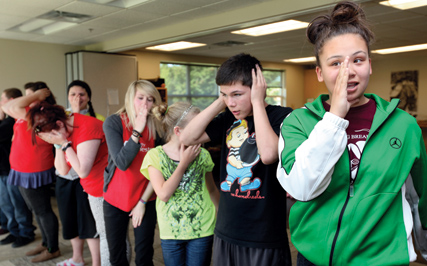Health & Education
British actors visit Tribal youth and teach performance skills

They came from England to teach Tribal youth a little something about the performing arts and the lessons exploded in Grand Ronde, giving youth the tools of self-expression, self-knowledge and impromptu public performance.
Harrie Perrott is one of six performing arts, music and dance students graduating this spring from the University of Chichester in West Sussex, England. Through personal contacts at Western Oregon University, he and the other students came over to teach Tribal members what they know about performance.
"They've been in contact with us for some time and wanting to set up a program," said Travis Stewart, a Tribal member and Cultural specialist working in the Youth Education program. "They came out in the last couple weeks and finally we were able to get them out this week and working with the kids."
"OK," Perrott said to the group, but to Tribal member Kyoni Mercier, 14, in particular because she was going to play this part. "You're at the beach and trying to dig the biggest hole you possibly can dig. The others," who in this skit included Tribal members Heyaza Brien, 15, and Kailiyah Krehbiel, 10, "are not helping. OK, go!"
Kyoni pretended to dig, and Heyaza and Kailiayah loitered around, sometimes whistling, sometimes looking up as if at the sky, doing everything but helping.
"OK, cut! Cut!" said Perrott. "Now you have the hiccups, and do the same scene."
Kyoni had that little addition down. Her hiccups were irresistible as a performance technique.
At some point, though, the hiccups got to Heyaza, who told Kyoni to get some water. After a few more minutes, Perrott broke down, too. "Cut! Cut! Now sing while you go about digging the hole."
And on it went as the Tribal actors came up with spontaneous song and jig-type dances to go with the digging.
And then, Perrott again: "Ok. End scene. Very good."
The program was filled with games and alternating roles, so that students sometimes directed and sometimes acted, and the same with the university students.
One game used for everyone to introduce themselves required each to come up with a physical movement to go along with their names. Others used the physical action each time the name was spoken.
For Heyaza, his motion was running his hand back through his hair, so everybody ran a hand back through their hair when using his name.
Tribal member Andrea Grijalva's action was shooting a basketball.
University student Sadie Brown's action was shimmying her hands back and forth on either side of her head.
"They were really good, actually," said Alex Neumann, 25, another of the university students. "I was quite pleasantly surprised. They're really responding well to our drama games."
Another game was "wolves." In that game, all start out in a circle with their eyes closed. A leader picks two of the group to be wolves but nobody else knows who they are. The job of the wolves is to "kill" two villagers, who are those still sitting with their eyes closed. The wolves get up secretly and "kill" one of the others by touching him or her on the shoulder and then sitting back down in the circle.
The leader says, "There's been a death in the family." With eyes open, each asks others questions to see if they can figure out who the wolves are. Finally, there's a vote, and if the one with the most votes is actually one of the wolves, the group has won. When both wolves are caught, the game ends.
It gives the kids "a voice," said Neumann, "to say how they feel and how they fit in among the Tribe. It's a forum to speak out to each other, not to adults. It should translate into their being able to talk about relationship things."
Heyaza said he developed talking skills and how to do different things in a group.
"We're learning about healthy relationships: trust and that kind of stuff," said Kyoni. "We're also learning about England, a lot of different words and vehicles. Everybody's cool here. We're having fun making skits."
"When we play games together," said Heyaza, "some are similar to ones we've played and some are different in some way, and that's cool."
The goal was for the Tribal members to use these skills for addressing specific social purposes.
"We're trying to have them devise a sketch about whatever issues they're concerned with: respect, communication, trust," said Neumann.
They made posters that say what healthy relationships are, Kyoni added, "and we talk about unhealthy relationships."
"It's awesome," said Kailiyah, who popped into the room and jumped into the conversation on her own.
A light was in her eyes.
Likewise for Heyaza, when he showed how he brushed his hand back through his hair.
For part of the time, you could not see the light in Kyoni's eyes. She was already wearing her Hollywood sunglasses.
"Going up there and performing," she said, "you get that good feeling. All eyes are on you."
Grand Ronde students participating were Tribal members Nikia Mooney, Anthony Simmons, Kailiyah Krehbiel, Kayla Grijalva, Andrea Grijalva, Reece Ebensteiner, Kyoni Mercier, Heyaza Brien, Hunter Latham and Kaylene Barry.
Youth Education staff members Travis Stewart, Chris Bailey and Matt Zimbrick, all Tribal members, and Jacinthia Stanley also participated.
On Thursday evening in the Youth Education building, the group put on an impromptu performance for families and community. Nobody knew what it would look like until the "curtain" went up.
